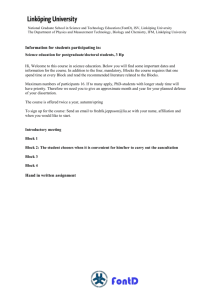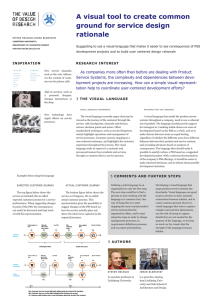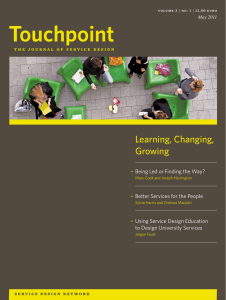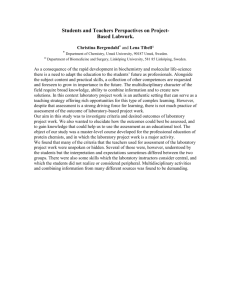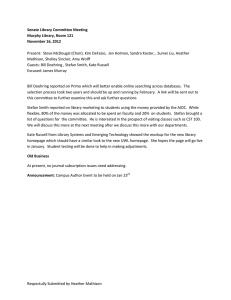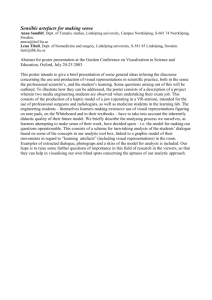Three perspectives on the material of Service
advertisement
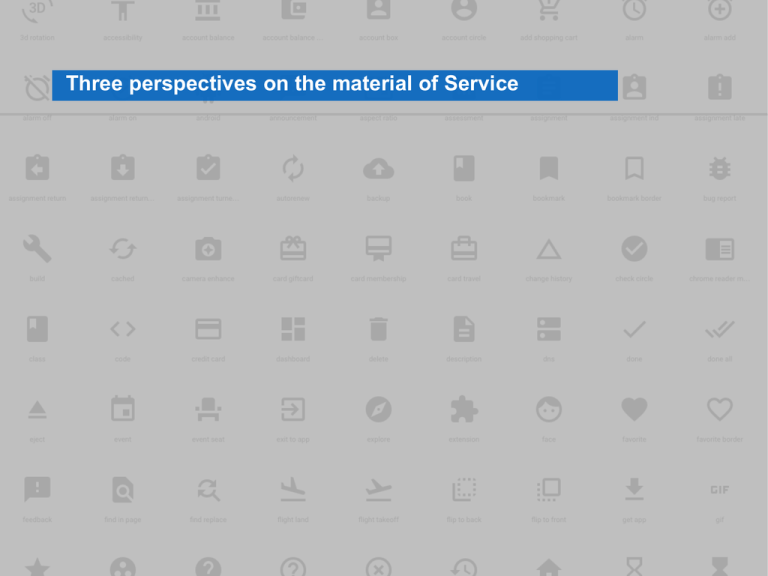
Three perspectives on the material of Service Three perspectives on the material of Service Simon Clatworthy - Oslo School of Architecture and Design (AHO) Johan Blomkvist - AHO + Linköping University Stefan Holmlid - Linköping University Three perspectives on the material of Service Introduction View one: definition of material View two: from practice View three: from theory Summary and conclusions Simon Clatworthy - Oslo School of Architecture and Design (AHO) Johan Blomkvist - AHO + Linköping University Stefan Holmlid - Linköping University Design is considered “A conversation with materials*” If “Designing as reflective conversation with the materials of a design situation” (Schön 1983, p.78), what then are the materials of Service? IHIP or Service Dominant Logic - materials for something highly immaterial? Something has to be combined, formed, customised and produced to deliver service. What are these materials, and can exploring them give insights of value for service innovation? * Schön, DA. (1983): The reflective practitioner: 3 different views 1. From dictionary - me 2. From prototyping - Johan 3. From theory of SDL - Stefan What is “material”? a) (1) the elements, constituents, or substances of which something is composed or can be made (2) matter that has qualities which give it individuality and by which it may be categorised <sticky material> <explosive materials> b) (1) something that may be worked into a more finished form (2) something used for or made the object of study <material for the next semester> (3) a performer’s repertoire <a comedian’s material> (Merriam webster, 2011). When related to Service … What are the the Elements, of which Service is composed? Which Qualities give individuality? What is a service innovators Repertoire? What is the Something that may be Worked into a more finished form? Viewed from a design perspective elements The , of which something is composed Comment Traditional view Design view Multiple elements Highly experiential Complex People Touchpoints Journey/time Backstage & org. It-infrastructure Time Drama, narrative, roles Situation and scenes Culture and symbology Integration of IHIP/SDL elements in unique Qualities which Servqual offering to provide give individuality Customer experience customer experience A performer’s repertoire Orchestration and Org. design integration skills key It-infrastructure Co-design Touch-points (people) Design thinking Something that Concept may be worked into a more finished Process /prototyping form NSD (New Service Development) Symbolic meaning Co-production Brand-experience Orchestrator/enabler Co-design Integrator Tool-maker Perceived offering Brand Experience prototype Service as a design material – a bottom up view Service design techniques Roleplay – making enactments of specific touchpoints or service moments and exploring them, using e.g. theatre methods. Does not require props made for the occasion. Customer journey maps – a depiction of the customer’s journey through a service with a focus on the experience. Blueprints – a depiction of all components, actions and interactions involved in a service delivery from back office procedures to receipts. Design scenarios – a description of a potential service use, used to explore certain aspects of the service. Storyboards – similar to customer journey maps, but focusing on the interactions and actions. The depiction is built in the same fashion as comic stories. Desktop walkthrough – using play dough, small figures, and whatever is available a service location is created and explored. Service Staging – one or more locations are built, complete with props that support immersion in the service experience. The service is then enacted. Can be done together with external stakeholders. What service designers design “Objects” of service design Components, things, locations Actions, procedures, interactions Experiences The scope of service design “Objects” of service design Components, things, locations Actions, procedures, interactions Experiences Associated design competence Architecture, product, graphical Usability, interaction Experience design What service designers design System Process Concept “Objects” of service design Components, things, locations Actions, procedures, interactions Experiences Associated design competence Architecture, product, graphical Usability, interaction Experience design Edvardsson & Olsson (1996) A theoretical view The Handbook of Service Innovation Stefan Holmlid Service logic Provider sphere Joint sphere Touchpoints Servicescape Etc. Customer sphere Example, import taxation (part of service) Example, import taxation (part of service) Active waiting Example, mailing list (part of service) Reflection Simon: Many possible perspectives Johan: Making something material Stefan: Sequences, balancing of power and tempo Insights for service innovation? The relation to the material The available tools Composing service
